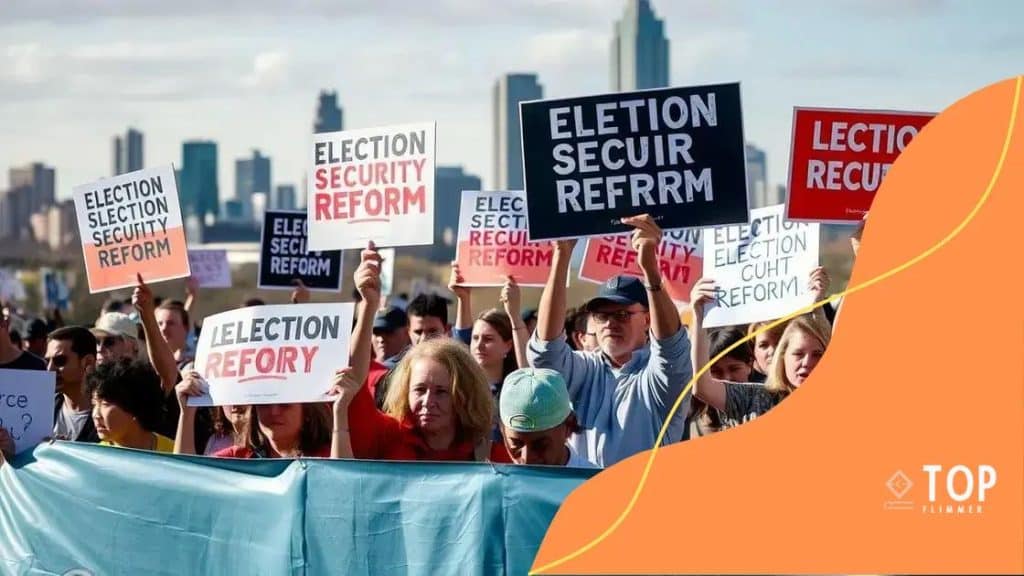Election security reform protests: a call for change

Election security reform protests demand greater transparency, access, and technology in the voting process, empowering citizens to advocate for secure and fair elections through grassroots engagement and awareness initiatives.
Election security reform protests are gaining momentum across the nation, as citizens demand greater transparency in our voting processes. What drives this urgent movement, and how can it shape the future of democracy? Let’s explore.
Understanding election security reforms
Understanding election security reforms is crucial for fostering trust in our democratic processes. These reforms aim to safeguard the integrity of our elections, addressing concerns that have risen in recent years.
What Are Election Security Reforms?
Election security reforms encompass a variety of measures designed to enhance the safety and transparency of voting. This includes the use of secure voting machines, rigorous audits, and clear procedures for reporting irregularities.
Why Are These Reforms Important?
The importance of these reforms cannot be overstated. By ensuring that every vote is counted accurately, we strengthen public confidence in the electoral process. The goal is to make sure that every citizen feels their voice matters.
- They help to prevent fraud and manipulation.
- Reforms promote transparency, making the process clearer for voters.
- Enhanced security measures protect against cyber threats.
Besides technology, education about election security is essential. Voters need to understand how their votes are protected, which can alleviate fears and misinformation. Providing clear information about the voting process fosters a sense of empowerment among voters.
Recent Examples of Reforms
Several states have implemented significant reforms recently. These initiatives address various aspects of the voting process, from registration to ballot security. For instance, some have adopted paper ballots to ensure verifiability, while others have invested in training for election officials.
- Implementation of risk-limiting audits in multiple states.
- Introduction of new voting technology to enhance security.
- Legislation focused on improving voter access while maintaining security.
As citizens engage with these reforms, it is essential to encourage discussions around their effectiveness and potential improvements. Election security reforms are not just about technology but also about building a culture of trust and accountability in our democratic institutions.
Key issues raised in protests
Key issues raised in protests around election security reform highlight the concerns of citizens who seek a fair and transparent voting process. These protests are a reflection of the public’s demand for accountability and integrity in elections.
Voter Access
One major issue is voter access. Many activists argue that election security reforms should ensure that all eligible voters can easily cast their ballots. This includes advocating for support such as same-day registration and extended voting hours. In contrast, some laws have made it more difficult to vote.
- Increased accessibility for individuals with disabilities.
- Protection against voter ID laws that can disenfranchise voters.
- More voting locations to reduce long lines.
Civil rights groups emphasize the need for reforms that enhance access rather than limit it. They believe that a secure election system must also be an inclusive one.
Election Technology
Another pressing concern is the technology used in elections. Many protesters call for the replacement of outdated voting machines. The push for secure technology is intended to prevent election interference and ensure accurate results. Public awareness around voting technology is essential in this regard.
- Implementation of paper ballots for verification.
- Regular audits of voting systems for accuracy.
- Enhanced cybersecurity measures to protect online registration systems.
Transparency in the technology used is crucial. Citizens want assurances that their votes are safe from hacking and manipulation. Discussions surrounding these issues often reveal the complexities involved in building a trustworthy election system.
Public Trust
A significant underlying theme is the need to rebuild public trust in the electoral process. Many people express skepticism about the government’s ability to manage elections securely. Ensuring that reforms address these trust issues is vital to empowering voters and convincing them that their participation matters.
Protests often bring together various groups advocating for reforms, increasing community engagement. The collective effort aims to foster a profound understanding of the importance of secure elections.
Impact of public opinion on policy changes

The impact of public opinion on policy changes regarding election security reform is significant. When citizens express their concerns and desires, policymakers often take notice. This dynamic interaction is crucial for shaping effective legislation that reflects the will of the people.
Public Awareness and Engagement
As awareness grows, so does engagement. Citizens are more informed about the importance of secure elections, leading to increased participation in protests and discussions. This active involvement sends a clear message to legislators that voters care about their electoral rights and security.
- Public campaigns can raise awareness about crucial security issues.
- Engaging with local communities helps amplify voices calling for change.
- Social media platforms serve as powerful tools for mobilizing public opinion.
The ability of citizens to express their opinions plays a vital role in how quickly policies can adapt. When large groups show support or dissent, it influences decision-makers to consider adjustments to laws or practices.
Polling Data and Legislative Action
Polling data serves as a reflection of public sentiment. When surveys show that a majority favors certain reforms, lawmakers may feel pressured to act. Understanding these trends can help guide the development of legislation that promotes election security.
- Polling can highlight issues that need immediate attention.
- Legislators often use data to justify their support for reforms.
- Polling can demonstrate the urgency of public demands.
This feedback loop between public opinion and policymakers creates a momentum that can lead to groundbreaking changes. People expressing their views can hasten reforms that may have stalled without such pressure.
Case Studies of Successful Reforms
Several case studies demonstrate how public opinion has led to policy changes. For instance, after widespread protests, some states enacted new voting laws that address security concerns and improve access. These measures not only respond to public demand but also reinforce trust in the electoral process.
By observing how collective voices can drive change, citizens gain inspiration to continue advocating for their rights. The interactions between public opinion and policy are essential to achieving a secure and fair election system.
Successful movements for election reform
Successful movements for election reform have emerged throughout history, demonstrating the power of grassroots activism. These movements inspire citizens to advocate for changes that promote fairer and more secure elections.
Historical Examples
One notable example is the Voting Rights Movement in the 1960s. Activists fought hard against racial discrimination in voting. Their efforts led to the Voting Rights Act of 1965, a landmark piece of legislation that improved access to the polls for millions. This movement showed how collective action can reshape election laws.
Modern Campaigns
Today, modern movements continue to push for reforms. Organizations unite to prioritize issues such as ballot access and election security. These groups often leverage social media to mobilize supporters and raise awareness about crucial issues.
- Grassroots campaigns motivate communities to participate in local elections.
- Innovative fundraising strategies help sustain efforts for long-term change.
- Collaborations with influential stakeholders boost credibility and visibility.
By highlighting success stories, activists inspire new generations to join the fight for fairer elections. Examples of recent movements include initiatives to automate voter registration and expand early voting.
Impact on Public Policy
Successful reforms often result from sustained pressure from these movements. When citizens demand change, lawmakers may respond by introducing legislation that aligns with public sentiment. This feedback loop is vital for ensuring that election reform efforts are effective and reflective of the people’s needs.
Public demonstrations serve as a platform for raising awareness and garnering support. These events bring together diverse communities, all advocating for secure and equitable voting systems. Recent protests have attracted attention to critical issues like voter suppression and technology security in elections.
As movements grow, their influence on policy becomes more prominent. Local and state governments begin to implement reforms that address the concerns voiced by protesters.
Steps to get involved in advocacy
Getting involved in advocacy for election security reform is a powerful way to make your voice heard. Every individual can play a role in shaping policies that promote fair and safe elections.
Educate Yourself
The first step is to educate yourself about the issues at hand. Understanding the challenges and solutions related to election security allows you to make informed arguments and decisions. Read articles, attend workshops, and follow reputable organizations that focus on voter rights and election integrity.
Join Local Organizations
Joining local advocacy groups is an excellent way to connect with like-minded individuals. These organizations often host events, provide resources, and engage with lawmakers. Active participation can amplify your voice and efforts, making a bigger impact.
- Attend meetings to discuss strategies for reform.
- Collaborate with community leaders to raise awareness.
- Participate in local events and actions to support reforms.
Networking with others who share your passion helps build a strong community that can influence policy changes.
Engage with Policymakers
Engaging directly with policymakers is crucial. Schedule meetings with your elected representatives to discuss your concerns about election security. This personal connection can make a significant difference as it shows that constituents care about these issues.
- Prepare clear points to discuss during your meetings.
- Follow up with a thank-you note to reinforce your message.
- Encourage others to join you in contacting their representatives.
Your representative needs to hear from voters to understand the public’s priorities. The more voices they hear, the more likely they are to act on these issues.
Utilize Social Media
Social media is a powerful tool for advocacy. Use these platforms to share information and raise awareness about election security reforms. Connect with groups and individuals who advocate for similar goals to amplify your reach.
Posting informative content, sharing personal stories, and organizing online campaigns can engage a wider audience. By creating an online community, you foster discussion and encourage more people to get involved.
Engaging in advocacy not only helps drive change but also empowers others to join the fight for secure and fair elections.
In summary, engaging in advocacy for election security reform is essential for ensuring fair and transparent elections. Everyone can contribute by educating themselves, joining local organizations, and engaging with policymakers. Using social media also amplifies your voice, helping to raise awareness about crucial issues. By coming together as a community, we can drive meaningful change and protect our democratic rights. Every action counts, and your involvement matters!
FAQ – Frequently Asked Questions about Election Security Reform Advocacy
How can I get involved in advocating for election security reforms?
You can start by educating yourself on the issues, joining local organizations, and engaging with policymakers.
What role does social media play in advocacy?
Social media helps raise awareness and mobilize support for election security issues by connecting people and sharing information.
Why is public opinion important for policy changes?
Public opinion influences lawmakers by showing them what citizens care about, prompting them to take action on crucial issues.
What are some successful historical movements for election reform?
The Voting Rights Movement of the 1960s led to the Voting Rights Act, showcasing how grassroots advocacy can change policies.






